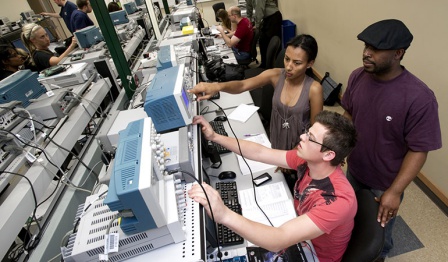




IEEE is the world’s largest association dedicated to advance in technological indication and excellence for the advantage of humanity. It is pronounced, “Eye-triple-E,” which stands for the Institute of Electrical and Electronics Engineers. The association is chartered under this name, and it's the complete legal name. The corporate office of IEEE is in New York City and its operations center is in Piscataway, New Jersey. It was formed in 1963 from the amalgamation of the American Institute of Electrical Engineers, and the Institute of Radio Engineers.
As of 2020, it's the world's largest association of technical professionals with quite 423,000 members in over 160 countries around the world. More than 60 percent of whom are from outside the United States. IEEE has 342 sections, 2562 chapters, 3485 student branches, and 2877 student branch chapters of IEEE technical societies and councils with the objective of educational and technical advancement of electrical and electronic engineering, telecommunications, computer engineering, and allied disciplines. And also it has 580 affinity groups which are non-technical sub units of one or more sections or a council.
Since that time, computers evolved from massive mainframes to desktop appliances to portable devices, linked to global networks connected by copper wire, microwaves, satellites, or fiber optics. IEEE’s fields of interest expanded well beyond electrical and electronics engineering and computing into areas such as micro- and nanotechnologies, ultrasonic, bioengineering, robotics, electronic materials, and many others. Electronics became ubiquitous, integrated in everything from jet cockpits to industrial robots to medical imaging
Most IEEE members are electrical and electronic engineers, but the organization's wide scope of interests has attracted people in other disciplines as well. An individual also can join the IEEE as a student member, professional member, or associate member. To qualify for membership, the individual must fulfill certain academic, or professional criteria, and abide by the code of ethics and bylaws of the organization.

IEEE and its members inspire a worldwide community through its highly cited publications, conferences, technology standards, and professional and academic activities. IEEE Xplore may be a powerful resource used with quite 4 million, documents that permit discovery and access to scientific and technical content published by the IEEE and its publishing partners. It provides online access to millions of full-text documents.
As a not-for-profit organization with a mission of advancing technology for humanity, IEEE is dedicated to serving professionals involved in all aspects of the electrical, electronic, and computing fields, and related areas of science and technology that underlie modern civilization.
IEEE is a leading developer of international standards that underpin many of today's telecommunications, information technology, and power-generation products and services.Often the central source for standardization in a broad range of emerging technologies, the IEEE Standards Association has an active portfolio of nearly 1,200 standards and more than 900 projects under development. This includes the prominent IEEE 802® standards for local, metropolitan, and other area networks, including Ethernet and Wireless LAN (commonly referred to as Wi-Fi®).
Learn more about IEEE standardsAs the philanthropic partner of IEEE, the IEEE Foundation inspires the generosity of donors to enable IEEE programs that improve access to technology, enhance technological literacy, and support technical education and the IEEE professional community.
The IEEE Foundation, a tax-exempt 501(c)(3) organization in the United States, fulfills its purpose by:
IEEE Foundation serves as a steward of donations that improve the human condition, empower the next generation of engineers and scientists, educate and raise awareness, energize and recognize innovation, and preserve the history of technology. With donor support, the IEEE Foundation strives to be a leader in transforming lives through the power of technology and education.
Learn more about the IEEE FoundationAccomplishments in IEEE technical fields are recognized with annual awards for outstanding contributions to technology, society, and the engineering profession.
IEEE Medals are the highest awards that IEEE presents on behalf of the IEEE Board of Directors. IEEE Medals embrace significant and broad IEEE interests and purposes. The highest honor is the IEEE Medal of Honor, which recognizes an individual for an exceptional contribution or extraordinary career in the IEEE fields of interest. Past recipients have included such visionaries as: